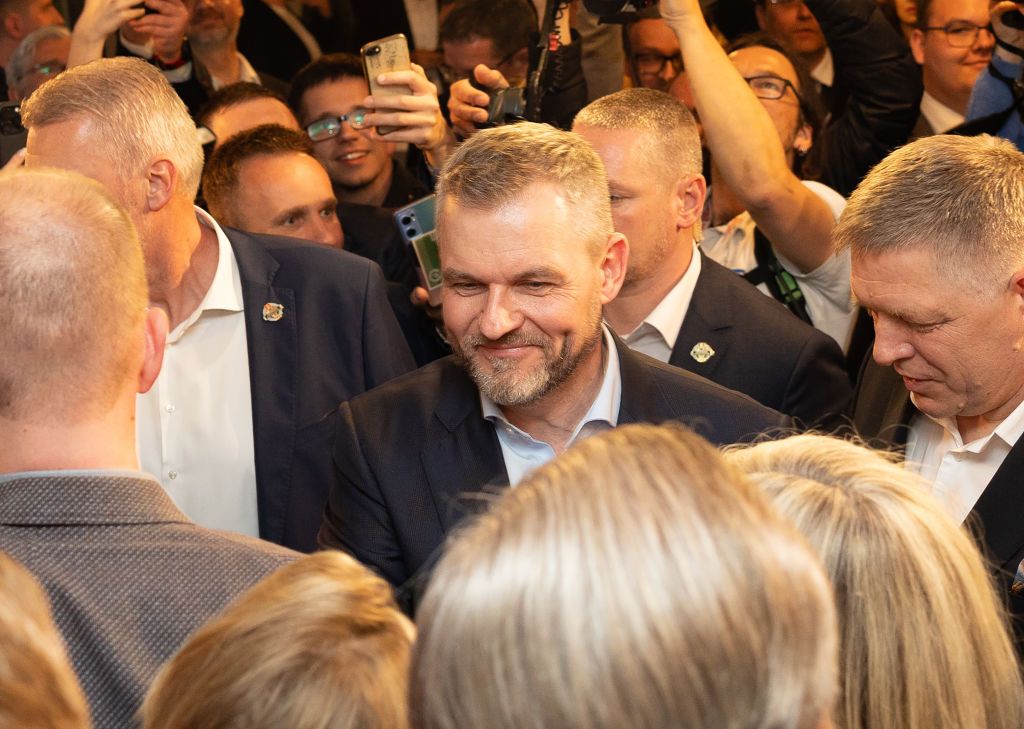Slovakia’s Prime Minister Robert Fico, known for his friendly stance towards Russia and firm opposition to providing military aid to Ukraine, is set to consolidate his hold on power following the victory of his ally, Peter Pellegrini, in the country’s presidential election. Pellegrini, a former prime minister, secured 53.85% of the vote, defeating pro-Western opposition candidate Ivan Korcok. Pellegrini has stated that he intends to keep Slovakia on the side of peace and not war, showcasing a departure from the country’s previous pro-Western stance under the leadership of Zuzana Caputova, the inaugural female president. Concerns have been raised that Slovakia may shift its alignment more closely with Hungary under Viktor Orban’s leadership.
In Slovakia, the president holds the authority to select the prime minister after parliamentary elections, administer the oath of office to the new government, and nominate judges to the constitutional court. The president also retains the power to veto legislation, although parliament can override these vetoes with a simple majority. Additionally, the head of state has the ability to grant pardons to convicted individuals. Critics fear that under Fico’s continued leadership, Slovakia may move away from its pro-Western trajectory and align more closely with the policies of countries like Hungary, which has been criticized for its populist stance.
Amidst political changes, Slovakia’s culture minister recently reversed a ban on working with Russia and Belarus. The ban, initially imposed after Russia’s full-scale invasion of Ukraine, prohibited communication and cooperation with the two countries. However, the ban did not affect the performances of Russian artists or organizations that openly condemned the war. This policy reversal reflects a potential shift in Slovakia’s approach towards Russia and Belarus, indicating a willingness to engage with these countries despite the ongoing conflict in Ukraine.
The dynamics of Slovakia’s foreign policy, particularly in relation to Russia and Ukraine, may undergo changes under Pellegrini’s presidency. As a former prime minister and ally of Robert Fico, Pellegrini’s victory signals a potential continuation of Slovakia’s stance towards Russia and Ukraine. However, Pellegrini’s statement about prioritizing peace over war suggests a shift in tone from his predecessor, Zuzana Caputova, who was a vocal supporter of Ukraine’s resistance against Russia. The future direction of Slovakia’s foreign policy remains uncertain, with observers closely monitoring any potential changes in alignment or approach under the new administration.
The outcome of Slovakia’s presidential election and the subsequent policies under Pellegrini’s presidency will have implications for the country’s relationship with Russia and its involvement in regional politics. Slovakia’s role in the conflict in Ukraine, its alignment with Western allies, and its position within the EU will be influenced by the leadership’s decisions and priorities. As Slovakia navigates its geopolitical landscape, balancing its historical ties with surrounding countries and its commitments to international partnerships will continue to be a key challenge for the new administration. The international community will be watching closely to see how Slovakia’s foreign policy evolves under Pellegrini’s leadership.
In conclusion, Slovakia’s political landscape is undergoing a transformation with Peter Pellegrini’s victory in the presidential election. The country’s stance towards Russia, Ukraine, and Western alliances may shift under Pellegrini’s presidency, potentially impacting regional dynamics and international relations. As Slovakia navigates these changes, balancing internal politics, foreign policy objectives, and international obligations will be crucial for maintaining stability and fostering positive relationships with neighboring countries and global partners. The direction that Slovakia takes under Pellegrini’s leadership will shape its role in regional politics and influence its standing in the international community.


